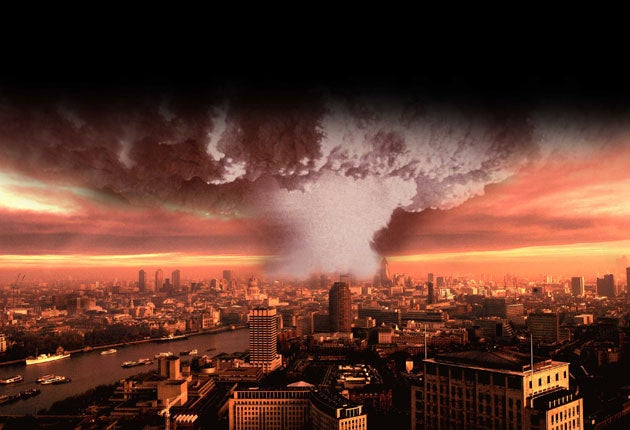BBC's dilemma over who would announce a nuclear attack

Your support helps us to tell the story
From reproductive rights to climate change to Big Tech, The Independent is on the ground when the story is developing. Whether it's investigating the financials of Elon Musk's pro-Trump PAC or producing our latest documentary, 'The A Word', which shines a light on the American women fighting for reproductive rights, we know how important it is to parse out the facts from the messaging.
At such a critical moment in US history, we need reporters on the ground. Your donation allows us to keep sending journalists to speak to both sides of the story.
The Independent is trusted by Americans across the entire political spectrum. And unlike many other quality news outlets, we choose not to lock Americans out of our reporting and analysis with paywalls. We believe quality journalism should be available to everyone, paid for by those who can afford it.
Your support makes all the difference."This is the Wartime Broadcasting Service. This country has been attacked with nuclear weapons." In the normally prosaic world of public safety announcements, they were probably the two most chilling sentences ever recorded in readiness for release across Britain's airwaves.
But secret documents released today, revealing for the first time the full text of the warning to be broadcast by the BBC in the event of a nuclear war, show that Whitehall was obsessed as much with the voice that would be used to announce Armageddon as it was with protecting what was left of the British population.
Senior civil servants in charge of drawing up the pre-recorded radio announcement became concerned that only a recognisable broadcaster should be used for fear that an unfamiliar voice would create the impression that Auntie had been "obliterated".
The quandary was deepened when it emerged that the only BBC employee to have been given the appropriate security clearance for the project was a relatively unknown retired newsreader called Hugh Searight. None of the BBC's star broadcasters – Angela Rippon, Michael Parkinson, Frank Bough or Richard Baker – were judged to have been checked to the required level. The apocalyptic tussle between the Beeb and three Whitehall departments in 1973 and 1974 is detailed in documents released at the National Archives in Kew, west London.
In one memo from the Ministry of Posts and Telecommunications, a senior manager suggests an "authoritative Voice of the BBC" was required for the advent of nuclear destruction.
The memo said: "The reassurance that the 'BBC is still there' would not be gleaned from a recorded announcement by an unfamiliar voice. Indeed, if an unfamiliar voice repeats the same announcement, hour after hour... listeners may begin to suspect they are listening to a machine... and that perhaps the BBC has been obliterated."
The debate arose from a Cabinet Office review of procedures to be followed in the aftermath of a nuclear attack, with 12 regions set up with an underground facility ready to play the announcement on a pre-arranged radio frequency.
The documents offer no clues as to who was chosen to make the recording but experts on Britain's nuclear war preparations say it almost certainly went ahead. Dr Kristan Stoddart, of the Mountbatten Centre for International Studies at Southampton University, said: "The whole enterprise seems macabre but the one thing that the British government ensured was done very well was the contingency planning for the aftermath of a nuclear attack."
Nuclear strike The news of the day
This is an edited transcript of the script to be used after a nuclear attack:
This is the Wartime Broadcasting Service. This country has been attacked with nuclear weapons. The number of casualties and the extent of the damage are not yet known. Stay tuned to this wavelength, stay calm and stay in your own homes. Radioactive fallout is many times more dangerous if you are directly exposed to it in the open. Roofs and walls offer substantial protection. Make sure gas and other fuel supplies are turned off and all fires are extinguished. You should refill all your containers for drinking water after any fires have been put out, because the mains supply may not be available for long. Until you are told that lavatories may be used again, other toilet arrangements must be made. Water means life. Don't waste it. Ration your food supply, because it may have to last for 14 days or more. If you live in an area where a fallout warning has been given, stay in your fallout room. When the immediate danger has passed, sirens will sound a steady note. The "all clear" message will also be given on this wavelength. Do not go outside the house. Radioactive fallout can kill. We shall repeat this broadcast in two hours' time. Stay tuned to this wavelength, but switch your radios off now to save your batteries until we come on the air again.
Join our commenting forum
Join thought-provoking conversations, follow other Independent readers and see their replies
Comments